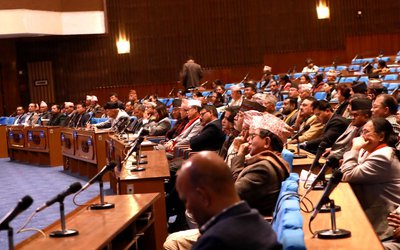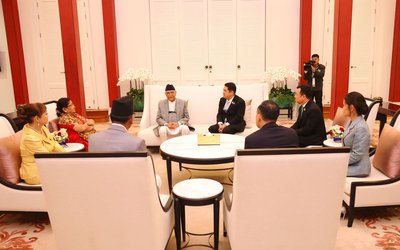More on News


A team of specialists working on the Global Study on the Implementation of UN Security Council Resolution 1325 (2000) conducted a two-day visit to Nepal From 11-12 February. The Global Study is a Security Council mandated report, which will assess progress at the global, regional and national levels in improving women’s participation and protection in conflict and post-conflict settings.
The visit to Nepal, led by prominent global expert and Lead Author of the Global Study, Dr. Radhika Coomaraswamy, included meetings with representatives of the Government of Nepal, the Constituent Assembly, the Nepalese Army, the National Human Rights Commission, the National Women’s Commission, the UN Country Team, civil society, development partners, and most importantly, those who have been directly impacted by the conflict, including women ex-combatants and survivors of conflict-related violence.
Dr. Coomaraswamy explained that Nepal was selected as the destination for one of several country visits she will be making in the coming months, to learn about the post conflict period and especially its national action plan (NAP) for the implementation of resolution 1325. “The drafting process of Nepal’s National Action Plan was consultative and participatory, and can serve as a model for other countries in the Global Study,” she said. During the course of her visit, Ms. Coomaraswamy learned about the NAP and progress toward its implementation, as well as other good practices and challenges for peace and security for the women of Nepal.
At the high-level opening of the Global Study visit, Minister of the Ministry of Law, Justice, Constituent Assembly and Parliamentary Affairs and the Ministry of Peace and Reconstruction, Narahari Acharya, stated “there can be no development without peace, and no sustainable peace without the meaningful participation of women,” and reaffirmed the Government’s commitment to implementing the NAP. Civil society representative and member of the High-Level Advisory Group for the Global Study, Ms. Bandana Rana, emphasized that, although the drafting of
Nepal’s NAP was highly inclusive and collaborative, “the same level of collaboration has not been seen during the implementation phase. Civil society hopes that we can work with the government and development partners to ensure that programs are reaching women and girls at the community level.”
During meetings with representatives of Government, development partners, UN agencies and civil society, Coomaraswamy heard about the notable progress Nepal has made in addressing the situation of women affected by conflict, including through the NAP. However, these meetings also highlighted the many impediments which remain, including barriers to women’s meaningful political participation, access to justice, and accountability and redress for sexual and gender based violence. The Common Platform for Conflict Victims and former women combatants both spoke movingly to Dr. Coomaraswamy regarding the hardships that they continue to face on a daily basis. The visit to Nepal will only be used to illuminate best practices; however, obstacles and challenges such as these will be addressed more generally throughout the report.
According to United Nations Information Center, the findings of the Global Study will help to chart the way towards a renewed global commitment to the international women, peace and security agenda. The report, to be published in October 2015, will conclude with a set of major recommendations, providing a basis for future advocacy toward the full implementation of the women, peace and security agenda. At the close of her visit, Dr. Coomaraswamy asked the government and the people of Nepal to take up these recommendations: “I hope that you will join me in working together achieve lasting peace and security for women in Nepal and around the globe.”

